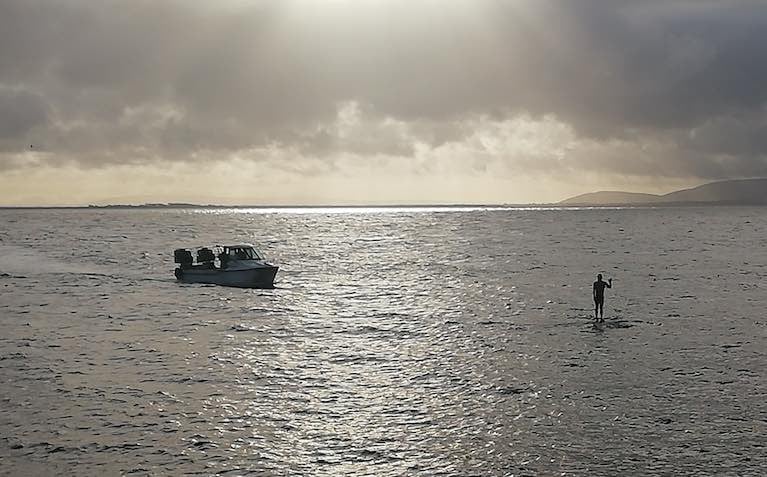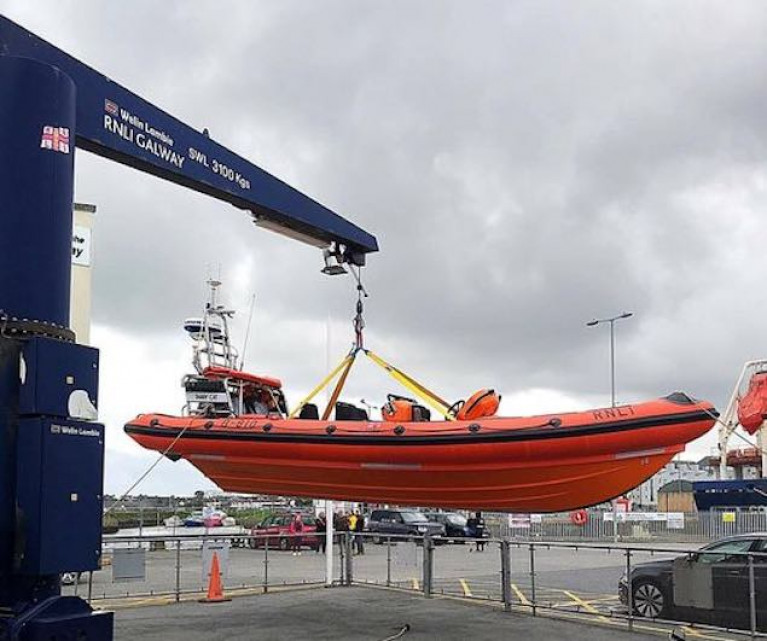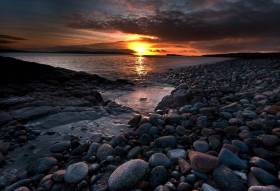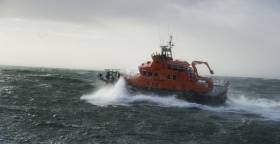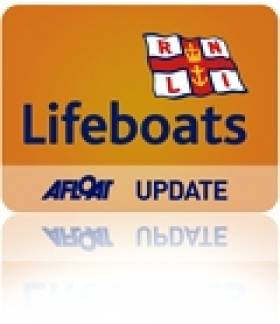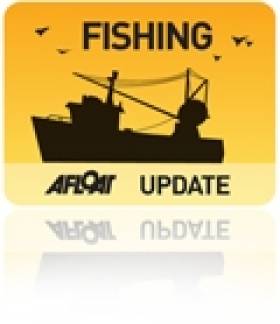Displaying items by tag: Fisherman
Young Fisherman's Body Recovered After Extended Search off Louth
The body of a young fisherman who had been reported missing after a boat sank off Co Louth earlier this week has been recovered.
The young crewman had been one of two crew on board a razor clam boat when it sank north of Dunany Point in Dundalk Bay, Co Louth, early on Tuesday.
One man was recovered and was treated in hospital in Drogheda, and a search was mounted for the second man.
The man’s body was found by Garda divers early on Thursday close to where the vessel was located.
The location was identified after the fishing charity LAST (Lost at Sea Tragedies) sought the assistance of marine survey specialist StatKraft Marine.
It provided a vessel equipped with multi-beam sonar to help survey the search area.
Emergency services had received a Mayday call from the vessel when it began taking in water at around 8.45 am on Tuesday, December 12th.
 Commissioners of Irish Lights vessel Granuaile joined in the search for the missing fisherman
Commissioners of Irish Lights vessel Granuaile joined in the search for the missing fisherman
The Dublin-based Coast Guard helicopter R116, along with Coast Guard units attached to Clogherhead, Greenore and Drogheda and the Clogherhead RNLI lifeboat participated in the search, along with a number of local vessels and the Commissioners of Irish Lights vessel Granuaile.
Fundraising Appeal for Young Family of Fisherman Who Died off Donegal
A fundraising appeal has been issued for the family of the fisherman who died off the Donegal coast last weekend.
Madis Lētsārs (37), from the Baltic States, lost his life after falling from the deck of a crab vessel north of the Donegal island of Árainn Mhór last Saturday evening (Feb 4).
His crewmates on the Séimí recovered him from the water and made efforts to revive him but he did not survive.
The young crewman was the father of two children, and his cousin Janis Miklasovs has set up a GoFundMe page on behalf of Madis’s wife Liene.
“It is with a heavy heart I write this message, as you may already know we sadly lost our cousin Madis in a tragic accident,” Miklasovs writes.
“ Madis was only 37 years old with his whole life ahead of him. He worked around the clock to provide for his family,” he says.
“Madis leaves behind a loving wife & 2 children & we hope to support them in every way possible,” he says.
“I kindly ask if you could make a donation, no matter how small, as this will greatly help the family financially. Your support is key in relieving some of the stress the family are currently facing,”he says.
“Rest easy Madis, you will never be far from our thoughts and always in our hearts,” he says.
The GoFundMe page is here
MCIB Report into Death of Galway Fisherman Published
An investigation into the death of a Galway fisherman who became entangled in gear off Salthill last year has found the weather deteriorated “significantly” after the vessel which he fished with his father left the harbour.
Tom Oliver (37), a relative of the Olivers who rescued two paddleboarders in Galway Bay in August 2020, died after he was dragged over the stern of the six-metre fishing vessel Myia on November 2nd 2020.
His father Martin, who was almost 62, was found dead at home the following morning.
After the incident, the then Mayor of Galway Mike Cubbard paid tribute to the two men as “salt of the earth” and “the best of friends”.
Cubbard noted that it was only a few weeks since he had recognised the role of their relatives, Patrick and Morgan Oliver, in rescuing paddleboarders Sara Feeney and Ellen Glynn after 15 hours at sea.
Several generations of the Oliver family have been associated with the RNLI lifeboat service, and members of the RNLI and the fishing communities along the coast and on the Aran Islands were among hundreds who attended the funeral of the father and son.
The Marine Casualty Investigation Board (MCIB) report into the incident said that “violent movements” generated by the worsening sea conditions while feeding out shrimp pots may have been a contributory factor.
The use of a mobile phone to generate a distress call, instead of a Mayday call over VHF radio, “added some delay, however short, in the alert of the emergency services”, the report found.
The report said a Mayday call over VHF radio would have been picked up immediately by Valentia Coast Guard, leading to immediate activation of the lifeboat crew pagers.
It said that activation of a personal locator beacon, which can be fitted to a PFD or lifejacket, would also have triggered an instant distress call.
It said the casualty was not wearing a personal flotation device (PFD) or lifejacket while operating on an open deck in hazardous conditions.
“Wearing a suitably specified and fitted PFD would have greatly improved his chances of survival,” the report stated.
The report noted that the crew were very experienced at potting in the Galway Bay area, and had been working on the twin-hulled vessel FV Myia for ten years, fishing lobster in summer and shrimp during the winter.
The report said that the weather “deteriorated considerably between the time the vessel left the harbour at midday on November 2nd, 2020, and the time of the incident.
“As seen in the Met Éireann weather report at the time of the incident there were near gale force winds, heavy rainfall, and rough seas,” it said.
“ These conditions were extremely challenging for a vessel of this size and construction and would have led to violent movements,” it said.
It noted that there are no manufacturers recommendations on the operational limitations of this type of vessel, and the manufacturing company is no longer in existence.
The report recalled that at approximately 1.30 pm, the men were resetting a train of pots when Tom Oliver got entangled in rope attached to the train of pots.
“ The weight of the train of pots combined with the forward motion of the vessel quickly pulled him overboard and under the water,” it said.
The Galway RNLI lifeboat operations manager was contacted by mobile phone, and he requested activation of pagers for an immediate launch of the inshore lifeboat.
It arrived quickly on the scene, and the lifeboat crew found the casualty caught in ropes and unconscious in the water.
The lifeboat crew got the casualty on board and immediately began cardiopulmonary resuscitation. It requested an ambulance, which met it at the lifeboat station.
Tom Oliver was brought to Galway University Hospital where he was pronounced dead.
The lifeboat then launched again to escort the fishing vessel Myia back to the harbour.
The MCIB recommends that the Minister for Transport should issue marine notices reminding fishing crew of the obligation to wear a PFD while working on open decks, and of the dangers associated with snagging in gear while setting trains of pots.
It also recommends that the minister issue marine notices to encourage use of VHF radio for distress calls, to point out the limitations of mobile phones for this purpose, and to advise fishers to know the limitations of vessels and to be aware always of weather forecasts before going to sea.
Swimmer Rescued by Olivers in Galway Bay
Galway Harbour father and son Patrick and Morgan Oliver have recorded another rescue, saving a swimmer who got into difficulty off Salthill on Saturday morning.
The Olivers were fishing off Salthill in Galway Bay on Saturday morning when a swimmer was spotted taking refuge on Palmer’s Rock, about 200 metres from shore.
The alarm was raised by a member of the public, and the father and son took the man on board and brought him to Galway docks.
 The fishermen arrived on scene and took the swimmer to Galway Harbour for treatment for symptoms of hypothermia Photo: Kevin O'Connell
The fishermen arrived on scene and took the swimmer to Galway Harbour for treatment for symptoms of hypothermia Photo: Kevin O'Connell
The man was taken into the Galway RNLI station where he received treatment for symptoms of hypothermia until an ambulance arrived.
The father and son were given a mayoral award several months ago for their rescue of paddleboarders Ellen Glynn and Sara Feeney off the southernmost Aran island of Inis Oírr in mid-August after 15 hours at sea.
Several weeks after that, the Olivers rescued a man from the river Corrib.
Their relatives, Martin and Tom Oliver, who were also fisherman, lost their lives after an accident in the bay early this month.
The Galway RNLI lifeboat was launched in Saturday’s incident, and two members of the lifeboat crew also made their way to Salthill promenade to assist.
Galway RNLI deputy launch authority Seán Óg Leydon said many people who have taken up sea swimming this year during the Covid lockdown may not realise the dangers of winter swimming.
“The sea is a great resource for us but we have to respect it and our limits. Luckily this swimmer made his way to a place he could rest and wait for assistance,” he said.
Galway Marine Community in Shock Over Fisherman's Death
The Galway fishing and wider marine community is in shock over the death of a young fisherman from a well known Claddagh family on Monday afternoon.
The fisherman, whose name has not yet been released, was working on the deck of his father’s vessel when he was thrown overboard.
As Afloat reported earlier, the vessel was working on pots between Blackrock and Silver Strand on the north side of Galway Bay when the incident occurred.
There was a light swell at the time, but visibility was good. The alarm was raised at lunchtime and the Irish Coast Guard tasked the Galway inshore lifeboat.
Upon arrival, the lifeboat crew took the casualty on board and administered cardiopulmonary resuscitation en route to Galway docks. The young man was then transported by ambulance to University Hospital, Galway.
The lifeboat crew were helmsman Martin Oliver, Brian Niland, Lisa McDonagh and Declan Killilea.
Death of a Fisherman, Loss of a Friend
The death in hospital of a lone fisherman after a tragic accident in Galway Bay on Wednesday moved Pierce Purcell of Galway Bay Sailing Club to post these thoughts yesterday to his fellow GBSC members, and he has forwarded them to Afloat.ie. We join with him and his friends and colleagues in heartfelt condolences to the family of Patsy Kelly
“Hearing the news of a lost fisherman on the late news last night, I drove to Renville Quay this morning afraid to press buttons on my phone to our harbour friends or the Ballinacourty fisherman many of us knew so well, for the obvious fear of what I might be told.
To my relief there were three well-known fishermen on the pier chatting in light rain. But on approaching Stephen Walsh who could not hold back the tears, I learnt the sad news that the lost fisherman was Patsy Kelly from Ballinacourty close to the club.
Patsy was an absolute gentleman, a full time fisherman yet interested in sailing and sailors. He built the hooker MacDuach before selling her to Dr Michael Brogan of Kinvara, the chair of Crinnu na mbad festival.
He was particularly safety conscious, and was recovered by the RNLI wearing his lifejacket. He was a serious fisherman who loved and respected the Bay, and was very well respected by all who shared his fishing grounds, which are our playgrounds.
Recently I had asked him to give a talk to the club this winter on “Fishing locally, the history of Island Eddy, and the Bay we use”. Although he was a shy man, he knew and cared enough about the topic to give the idea of such a talk some serious thought.
Our deepest sympathy to his wife Anne who spent many years windsurfing at Renville, and his son, to be married next week.
God Bless you, Patsy”
Two fishermen have been brought to safety this afternoon by the RNLI after they got into difficulty off the Wexford coast.
Wexford RNLI was requested to launch their inshore lifeboat at 12.08pm following a report that a fishing vessel with two people on board was experiencing mechanical difficulty a mile and a half south east of Blackwater Head.
The lifeboat helmed by Frank O’Brien launched and made its way to the scene. Wexford RNLI then requested the assistance of Rosslare Harbour RNLI due to the location of the fishing vessel some 12 miles north of Rosslare Harbour. It was the fourth call out in a week for the volunteer lifeboat crew from Rosslare.
The all-weather lifeboat under Coxswain Eamonn O’Rourke and with eight volunteer crew members on board launched at 12.29pm and made its way to the scene.
Weather conditions at the time were described as overcast but good. The men had been razor fishing when their boat got caught in lobster pots.
Once on scene, the lifeboat crew observed that no one was in immediate danger and began to work with the fishermen to establish a towline.
The vessel was then taken under tow and brought to the bar of Wexford escorted all the time by Wexford RNLI’s inshore lifeboat. Once there, Wexford RNLI took over and brought the vessel to shore at 4pm with the assistance of another fishing vessel which was in the area at the time. Having only finished a routine exercise when they were requested to launch at midday, this meant the volunteers from Wexford had spent some six hours at sea.
Meanwhile, yesterday (Saturday 12 March) Rosslare Harbour RNLI’s all-weather lifeboat under Coxswain Keith Miller launched in thick fog at 7am after a fishing boat with three people on board was reported to have lost its rudder just off Rosslare. The lifeboat once on scene took the boat under tow and brought it to Blackrock where it was met by Kilmore Quay RNLI’s all-weather lifeboat which towed it into Kilmore Quay.
Meanwhile, at 6.30am on Thursday, the lifeboat launched under Coxswain Eamonn O’Rourke to go the assistance of a fishing boat which had broke from her moorings overnight and blew ashore due to a change in the weather conditions. On this occasion the lifeboat crew established a tow before the vessel was brought alongside the fishermen’s wall in the harbour.
Speaking following today’s call out, David Maloney, Rosslare Harbour RNLI Lifeboat Operations Manager said: ‘The fishermen did the right thing this afternoon and raised the alarm when they began to experience some difficulty. Our volunteers both from Rosslare Harbour and Wexford responded rapidly and worked well together to bring the fishermen safely to shore. It has been a busy week for our volunteers but they are always ready and delighted to help anyone in need at sea.’
Both Ballyglass RNLI lifeboats Launched in Search for Missing Mayo Fisherman
Both Ballyglass RNLI all-weather and inshore lifeboats are involved in the continued search for the missing Mayo fisherman. The volunteer lifeboat crews at Ballyglass have launched every day since the young fisherman was reported missing last Friday (11 September) and are taking part in an extensive multi-agency search. They are co-ordinating the sea search, involving a large number of vessels.
Ballyglass RNLI launched again this morning shortly after 9am and commenced searching off Erris Head and around Broadhaven Bay. Conditions have been described as good.
Commenting on the continued search Ballyglass RNLI Lifeboat Operations Manager Padraic Sheeran said, ‘ There is an incredible community effort involved in the search and we have seen our entire volunteer lifeboat crew take part in it along with our colleagues in the Coast Guard, the Civil Defence, the Gardaí, the Order of Malta and local diving clubs and boats.
Our thoughts are very much with the family and friends of the young man at this time.’
Baltimore Lifeboat Aids Fisherman Overcome With Fumes
#rnli – Baltimore inshore lifeboat was called to give assistance when a medical emergency occurred on board a 75ft fishing vessel in Roaring Water Bay, West Cork last night. The two crew on board had been pumping the vessel bilges with a petrol pump when one of them became overcome with fumes and collapsed. The boat which services mussel rafts in the bay was at her moorings at the time. The casualty was a young man in his late twenties. His fellow crew called for assistance and managed to get him above decks.
The call for assistance was received at Baltimore lifeboat station at 18:51. Weather conditions were very poor at the time, with winds of Force 6 gusting to Force 7 and a sea swell of 1.5 metres. The inshore lifeboat was tasked into service because it could more easily negotiate the mussel rafts strung out along the bay.
Helm Jerry Smith with crew Tadhg Collins and Colin Rochford proceeded through the islands of Roaring Water Bay in pitch darkness in the twin engined Atlantic 75 RIB. When they arrived on scene at 19:30, Schull Community Rescue were already providing medical assistance. The Baltimore lifeboat were able to support efforts to revive the casualty providing essential oxygen.
A Coast Guard helicopter was dispatched to evacuate the young man. He was winched off the deck of the fishing boat at 20:15 and taken to Cork University Hospital.
The inshore lifeboat then returned in worsening weather conditions to the lifeboat station arriving back at 21:30. Crewman Tadhg Collins said, 'it was good to see rescue services working together in a coordinated fashion to ensure the safety of life at sea'.
Spanish Fisherman Fined for Illegal Fishing Activity
#fishing – Following a conviction at Cork Circuit Court, today, Friday 28th February, the Master of a Spanish fishing vessel was fined a total of €2,500 and forfeited €80,000, being the assessed value of his catch and a further €12,500 for the fishing gear onboard. Jesus Ramon Rea Rosales, Master of the fishing vessel Armaven Dos, pleaded guilty to the under-recording of monkfish in the vessel's EU logbook. The case arose during the course of a routine inspection of the Armaven Dos on the 5th August 2013, at Castletownbere, Co Cork, by Sea-Fisheries Protection Officers of the Sea-Fisheries Protection Authority (SFPA).
Sea-Fisheries Protection Officers inspected the vessel's onboard catch and when compared to its fishing logbook they discovered approximately 13 tonnes of monkfish retained onboard of which almost seven tonnes were unrecorded. In addition to the under-recording of monkfish, a substantial quantity of Megrim was also found to be unrecorded. The under-recording of catch is contrary to European Community Regulations as fishermen are required to keep an accurate record in the vessel's logbook of the fish they have onboard so that the catch limits and quotas imposed to protect these fish stocks are respected.
Susan Steele, Chair of the SFPA welcomed the outcome of the case and said: ""It is essential that all fishermen play their part in the rebuilding of damaged fish stocks such as monkfish if fishing is to be sustainable and profitable into the future. The requirement for fishermen to accurately record their catches and to keep within quota limits is a cornerstone of measures to rebuild damaged fish stocks and to share the burden of this stock recovery fairly among fishermen. The SFPA's inspection programme is intended to detect illegally caught fish and to protect the livelihoods of the many fishermen who respect the rules in place that safeguard the sustainable exploitation of valuable fish stocks. Stock recovery is good news for fishermen and ultimately leads to better fishing possibilities for the sector as well as improved market supply for consumers."


























